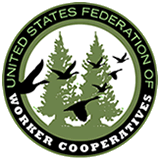Related Research Articles

A cooperative is "an autonomous association of persons united voluntarily to meet their common economic, social and cultural needs and aspirations through a jointly owned and democratically-controlled enterprise". Cooperatives are democratically controlled by their members, with each member having one vote in electing the board of directors. They differ from collectives in that they are generally built from the bottom-up, rather than the top-down. Cooperatives may include:

KF is a federation of consumer co-operatives in Sweden and a retail group, with groceries as its core business.
A worker cooperative is a cooperative owned and self-managed by its workers. This control may mean a firm where every worker-owner participates in decision-making in a democratic fashion, or it may refer to one in which management is elected by every worker-owner who each have one vote.

The United States Federation of Worker Cooperatives (USFWC) is a federation of worker cooperatives in the United States. USFWC was founded at the U.S. Conference of Democratic Workplaces in Minneapolis, Minnesota in May 2004.
The International Cooperative Alliance (ICA) is a non-governmental cooperative organization founded in 1895 to unite, represent and serve cooperatives worldwide. The ICA is the custodian of the internationally recognised definition, values and principles of a cooperative in the ICA Statement on the Cooperative Identity. The ICA represents 315 co-operative federation and organisations in 107 countries.

A consumers' co-operative is an enterprise owned by consumers and managed democratically and that aims at fulfilling the needs and aspirations of its members. Such co-operatives operate within the market system, independently of the state, as a form of mutual aid, oriented toward service rather than pecuniary profit. Many cooperatives, however, do have a degree of profit orientation. Just like other corporations, some cooperatives issue dividends to owners based on a share of total net profit or earnings ; or based on a percentage of the total amount of purchases made by the owner. Regardless of whether they issue a dividend or not, most consumers’ cooperatives will offer owners discounts and preferential access to goods and services.
A food cooperative or food co-op is a food distribution outlet organized as a cooperative, rather than a private or public company. Food cooperatives are usually consumer cooperatives, where the decisions regarding the production and distribution of its food are chosen by its members. Like all cooperatives, food cooperatives are often based on the 7 Rochdale Principles, and they typically offer natural foods. Decisions about how to run a cooperative are not made by outside shareholders, therefore cooperatives often exhibit a higher degree of social responsibility than their corporate analogues.
Coop or Co-op most often refer to:

Cooperative economics is a field of economics that incorporates cooperative studies and political economy toward the study and management of cooperatives.
A co-operative federation or secondary co-operative is a co-operative in which all members are, in turn, co-operatives. Historically, co-operative federations have predominantly come in the form of co-operative wholesale societies and co-operative unions. Co-operative federations are a means through which co-operatives can fulfill the sixth Co-operative Principle, co-operation among co-operatives. The International Co-operative Alliance notes that “Co-operatives serve their members most effectively and strengthen the co-operative movement by working together through local, national, regional and international structures.”
The history of the cooperative movement concerns the origins and history of cooperatives across the world. Although cooperative arrangements, such as mutual insurance, and principles of cooperation existed long before, the cooperative movement began with the application of cooperative principles to business organization.

United Workers Cooperatives, also known as Allerton Coops, is a historic apartment building complex located at 2700–2870 Bronx Park East in Allerton, Bronx, New York City. The complex includes three contributing buildings and five contributing structures. The Tudor Revival style buildings were built during two construction campaigns, 1926–1927 and 1927–1929 by the United Workers' Association. The buildings feature half timbered gables, horizontal half-timbered bands topped with sloping slate roofs, corbelled and crenellated towers, and picturesque chimneys.
Economic democracy is a socioeconomic philosophy that proposes to shift ownership and decision-making power from corporate shareholders and corporate managers to a larger group of public stakeholders that includes workers, consumers, suppliers, communities and the broader public. No single definition or approach encompasses economic democracy, but most proponents claim that modern property relations externalize costs, subordinate the general well-being to private profit and deny the polity a democratic voice in economic policy decisions. In addition to these moral concerns, economic democracy makes practical claims, such as that it can compensate for capitalism's inherent effective demand gap.
Media cooperatives are a form of cooperative that report on news based on the geographic location of their membership, or the general interests of the membership. Often they are a form of alternative media, critical of mainstream perspectives, with progressive society stances. However, several cooperatives outside of the West are established mainstream media outlets. Media cooperatives often unite customers and service providers to oppose a pure profit motive in the media. In contrast to mainstream media companies, media cooperatives are able to report independently, due to the minimization of the Principal–agent problem. Media cooperatives are growing in popularity as a form of organization for media reporting, however access to capital and lack of awareness in society present challenges to proliferation.
A platform cooperative, or platform co-op, is a cooperatively owned, democratically governed business that establishes a two-sided market via a computing platform, website, mobile app or a protocol to facilitate the sale of goods and services. Platform cooperatives are an alternative to venture capital-funded platforms insofar as they are owned and governed by those who depend on them most—workers, users, and other relevant stakeholders.
Playbour is a hybrid form of play and labour, specifically in the digital games industry.
References
- ↑ Multi-stakeholder cooperatives on Cultivate.Coop http://cultivate.coop/wiki/Multi-stakeholder_cooperatives#Worker_Consumer_Hybrid